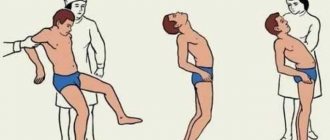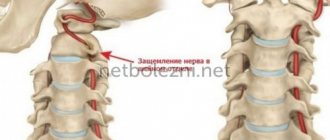Weakness occurs with many diseases, so it is almost impossible for a non-specialist to immediately determine what happened. Weakness in the legs is a very nonspecific symptom that can accompany disturbances in the functioning of many organs and systems. However, such a symptom should never be ignored, since even after heavy physical activity, weakness should go away after a short rest. If weakness in the legs occurs for no apparent reason, much less repeats repeatedly or its severity intensifies, you should consult a doctor immediately.
As mentioned earlier, there are many reasons for weakness in the legs; accordingly, the patient is faced with the question - what specialty should he see a doctor? Most often, such a specialist becomes a neurologist, and a little less often a therapist and an orthopedic traumatologist.
At CELT you can get advice from a neurologist.
- Initial consultation – 3,500
- Repeated consultation – 2,300
Make an appointment
Causes of weakness in the legs
Conventionally, the reasons can be divided into several groups:
- damage to the vascular system;
- muscle damage;
- damage to peripheral nerves;
- diseases of the central nervous system (brain or spinal cord);
- psychological and mental problems;
- joint diseases;
- diseases of the spine;
- intoxication.
During the initial examination and history taking, special attention is paid to the dynamics of the process - whether the weakness arose suddenly or gradually increased, whether it is constant or intermittent, and so on. It is important to find out not only the events that preceded the appearance of weakness in the legs, but also the accompanying symptoms: pain, swelling, convulsive twitching, dizziness, change in skin color, trembling, fever, degree of movement impairment, and the like.
A comparison of clinical and laboratory data allows you to quickly understand which disease of which organ or system caused weakness in the legs. CELT doctors have at their disposal an excellent diagnostic base, with the help of which they can determine not only the disease itself, but also how long it has existed, as well as its severity and prognosis.
Algorithm for prescribing CPAP therapy
Constant sleepiness is a huge problem. Sleep is necessary for every living organism. Man, as a highly organized being, needs it especially strongly. In a dream, complete rest and restoration of spent energy occurs. All information and skills received the day before are processed and systematized for further use. That’s why proper sleep is so important: deep and long. Some people can fall asleep by simply unplugging, like an electrical appliance unplugged. They do not know the state of insomnia, shallow sleep, and frequent awakenings. However, there are few such lucky ones. Deep sleep is an unattainable dream for most. However, most often, the person himself is to blame for the violation of sleep patterns and quality. For the sake of watching TV and computer games, he often takes hours away from his night's rest, and the next morning he suffers from its lack. The fatigue of the previous day, which should remain confined to the bed, remains and accumulates over time.
Daytime sleepiness is a consequence of the body’s desire to compensate for insufficient nighttime sleep with daytime sleep. Drowsiness is often accompanied by depression. Therefore, you should not wait for this condition to normalize on its own. You can try to adjust your daily routine yourself. Perhaps this alone will solve all sleep problems. However, if the problem persists, you should consult a doctor. It will help not only get rid of drowsiness, but also find out why it appeared. For each cause there is a treatment.
Let's take a closer look at the reasons:
Insufficient sleep - insufficient sleep can be easily eliminated or corrected by changing work and rest modes. If insufficient sleep is caused by diseases (depression, chronic pain, etc.), it is necessary to treat the disease and sleep will improve.
Sleep disorders - Many sleep disorders lead to excessive daytime sleepiness. As a rule, sleep is either fragmented or leads to a general decrease in sleep duration.
Depression requires proper therapy
Side effects of medications require consultation with your doctor and treatment adjustment
Mental disorders require the attention of a psychiatrist
If you feel that daytime sleepiness is reducing the quality of your life, then there is no need to waste time. It is better to immediately seek the help of a specialist: first a therapist, then a somnologist.
You may need to visit a specialist for related diseases that cause drowsiness. By following the competent advice of doctors and taking the medications they prescribed, you can quickly regain sound sleep, good health in the morning, vigor and efficiency, which is enough for the whole day. It is important not to prolong the problem and not expect it to go away on its own over time. The sooner you start treating drowsiness, the faster you will be able to cope with it.
Our doctors
Novikova Larisa Vaganovna
Neuropathologist, Candidate of Medical Sciences, doctor of the highest category
Experience 39 years
Make an appointment
Pankov Alexander Rostislavovich
Neurologist
40 years of experience
Make an appointment
Circulatory disorders
Vascular diseases of the nervous system, which can result in stroke and heart attack, are becoming more common among patients. In this case, situations of so-called transient ischemic attacks are possible, when a “flickering” of symptoms occurs - weakness occurs acutely, but quickly passes. After such an incident, you cannot be complacent and assume that everything turned out okay. It is necessary to identify the cause of the incident as quickly as possible and take appropriate preventive measures.
Stroke and heart attack can occur not only in the brain, but also in the spinal cord. A spinal stroke that occurs at any level can leave a person disabled or require a long and incredibly labor-intensive recovery. It must be said that due to the structure of the spinal cord, recovery after a spinal stroke is rarely successful, even in comparison with a stroke that affects the brain.
Weakness in the limbs may result from myocardial infarction, in which case gastrointestinal symptoms are often associated - nausea, abdominal pain, bloating. Some forms of heart attack thus remain undiagnosed, since the clinical picture is not typical and “imitates” an acute disease of other organs (for example, acute pancreatitis).
The veins or arteries of the lower extremities may be affected. Chronic venous insufficiency not only reduces physical strength, leads to pain and causes aesthetic problems, but also threatens the formation or separation of a blood clot (which, if the circumstances are unsuccessful, can block the pulmonary artery - pulmonary embolism is often a fatal condition). Blood stagnation also occurs in chronic heart failure, when swelling appears in the legs.
The formation of atherosclerotic plaques in the lumen of the vessel is a common cause of gait disturbance in the elderly. The so-called “intermittent claudication” develops.
Obliterating endarteritis also manifests itself as intermittent claudication, when the lumen of the vessels gradually narrows. Raynaud's disease is manifested by changes in skin color, weakness and swelling, the trigger for which is often hypothermia or frostbite. Menopause and premenstrual syndrome can also cause transient leg weakness.
Why does general weakness occur?
What reasons could be responsible for the resulting weakness? All reasons can be divided into two large groups - known and unknown. So, for example, if a child or adult is sick with the flu or has a high fever, it is natural that he will feel exhausted even without any physical activity, and the reason for his poor health is obvious. It’s another matter when a person feels general weakness for a long time without any significant accompanying symptoms, and does not know that this condition could be a manifestation, for example, of anemia or pathologies of the endocrine system.
Content:
- Why does general weakness occur?
- Clinical classification of malaise
- Symptoms that form and accompany a feeling of general weakness
- Weakness due to infectious diseases
- Signs of oncological processes
- Weakness due to diabetes
- Diseases of the spine that may cause loss of strength
The fact is that fatigue itself and a general state of weakness can be a symptom of a large number of diseases due to many reasons. Among them, for example, there is vitamin deficiency - a lack of vitamins, one or more. Often, causeless weakness is a consequence of a lack of B vitamins in the body, especially vitamin B12, which is responsible for the production of red blood cells and prevents the development of anemia. It is because of its lack that a person can develop anemia (anemia) and provoke a state of weakness and weakness. The deficiency of vitamin D, produced by the body under the influence of ultraviolet radiation, is especially noticeable in winter and autumn. The resulting feeling of chronic fatigue and weakness during these seasons can be triggered by a lack of the “sunshine” vitamin.
Depression is a serious psychiatric disorder, and not a banal bad mood, as quite a large number of people mistakenly think. It manifests itself as a constant feeling of depression, physical and mental inhibition, disturbances and disorders of thinking.
Diseases of the thyroid gland and associated hormonal disorders lead to a feeling of weakness, for example, with hyperthyroidism or hypothyroidism. Reduced organ function (hypothyroidism) provokes weakness in the limbs, when everything literally “falls out of hand,” according to patients. Hyperthyroidism, in addition to the described feeling, is accompanied by nervous excitability, hand tremors, fever, and heart rhythm disturbances.
Celiac disease is a not very common pathology, which consists of the inability to digest gluten. If the subject is unaware of the problem and continues to consume flour products and various flour products, in addition to flatulence and diarrhea with loose stools, he will experience constant fatigue.
Some other reasons for constantly feeling weak:
- taking certain medications (antihistamines, beta blockers, antidepressants);
- vegetative-vascular dystonia;
- diabetes;
- oncological diseases;
- chronic fatigue syndrome;
- dehydration;
- anemia and other blood diseases;
- cardiovascular diseases;
- acute and chronic infectious processes, acute respiratory viral infections and colds;
- state of intoxication.
In addition, a state of malaise can develop during menstruation in women, with injuries to the torso and skull, after general anesthesia and operations.
Sensory disturbances due to nerve damage
This is the most common disorder in diabetes mellitus - polyneuropathy, which almost inevitably occurs 15 or 20 years after the onset of the disease, but everything can happen much earlier. Numbness, heaviness, and decreased sensitivity appear.
The same disorders occur with funicular myelosis or degenerative disease of the spinal cord, when deep sensitivity is immediately impaired.
Neurologists identify many causes of polyneuropathy - from viruses to chronic alcoholism. Among them are tick bites, cytomegalovirus, tumors, diphtheria, chemical poisoning and much more.
Psychological problems
Emotions influence our lives much more than we realize. The fact is that the body’s reactions are regulated by the autonomic nervous system, another name for which is the autonomic one. This system operates according to its own laws, regardless of our will and desires. Therefore, the body's reactions - heartbeat, breathing, blood circulation, digestion, spasms - practically cannot be regulated by willpower. Our every daily experience, and even more so mental illness, affects the functioning of all organs and systems.
Weakness in the legs occurs with the following disorders:
- panic attack;
- hysteria;
- prolonged stress;
- anxiety disorder;
- depression;
- schizophrenia;
- nervous exhaustion or neurasthenia;
- chronic psychotrauma;
- neurocirculatory dystonia.
Fighting fatigue at home
Often, a simple lack of sunlight in winter and autumn is the cause of drowsiness. To feel more energetic, you need to install fluorescent lamps at home. In the morning, immediately after waking up, turn them on, even if you want to be in the dark. The eyes will get used to the light, the brain will wake up faster and begin to function normally. The following methods will help you get rid of severe weakness and lethargy at home:
- Morning running
. Physical activity accelerates blood circulation, accelerates metabolic processes, and saturates cells with oxygen. - Fresh juice
. Vegetable and fruit drinks will fill the body with nutrients, relieve vitamin deficiency, and charge you with energy for the whole day. - Cold and hot shower
. Hot and cold water helps wake up the body in the morning. In addition to awakening the soul, it will strengthen the immune system, improve metabolism, and serve as a prevention of cardiovascular diseases. - Color and aromatherapy
. You need to look at bright objects (orange, light green, red) or inhale the sharp aroma of citrus or spice. Essential oils of lavender, pine needles, rosemary, and jasmine work well against drowsiness.
Scientists, along with exercises, gymnastics, and jogging, advise having sex regularly. In addition to its positive impact on health, intimacy neutralizes the effects of stress. Also stimulates the growth of brain cells, causing them to use more oxygen.
The diagnosis of “hyperthyroidism” can be very surprising to the patient, because previously he attributed the first signs of thyroid dysfunction to banal fatigue or chronic lack of sleep. Read more in the article: “in which cases will hyperthyroidism go away on its own?”
Invigorating herbal teas
In addition to the tannin and caffeine found in tea and coffee, herbal teas will help keep the body in good shape for adults. A drink based on ginseng root is especially popular. It stabilizes energy metabolism, relieves symptoms of chronic fatigue, helps the body rest during the night, and sharpens alertness and brain activity.
Pills for fatigue and drowsiness have many side effects, so it is better to deal with lethargy in natural ways.
Eleutherococcus is no less effective. The plant increases performance, enhances physical and mental endurance, eliminates signs of fatigue, sharpens hearing and vision.
You can brew Chinese lemongrass. In the form of regular tea, it helps get rid of weakness, regulates reflex activity, improves memory and performance.
| Drink | How to brew | Dosage | Contraindications |
| Ginseng | 1 small spoon per glass of boiling water. Simmer over low heat for 2-3 minutes, cool, strain | ½ glass three times a day | Mental disorders; epilepsy; bleeding; pregnancy, especially in the early stages; dermatitis, eczema; high blood pressure; hypersensitivity to active components |
| Eleutherococcus | Instead of tea three times a day | ||
| Schisandra chinensis | 1-2 glasses per day | ||
| Ginger | 1-3 times a day, 100 ml |
Fresh ginger root is drunk to improve tone, cleanse blood vessels in the brain, and normalize blood pressure. The plant prevents the development of dangerous diseases due to its ability to remove toxins. Another tonic drink is chicory tea.
The color is very similar to coffee, but does not excite the nervous system, but stabilizes blood glucose levels, helps with obesity, digestive problems, and metabolic disorders.
Invigorating food and nutrition tips
Dark chocolate will help you urgently overcome drowsiness. It contains antioxidants, minerals, and flavonoids. They promote the production of dopamine and serotonin, enhance brain activity, and normalize hormonal levels.
Dark chocolate in large quantities can cause allergies, so nutritionists recommend eating no more than half a bar per day.
To always feel energetic and not face constant lethargy and fatigue, you need to improve your diet. The diet of a healthy man and woman should include healthy natural foods. These include:
- Oat groats
. Contains simple and complex carbohydrates, minerals, vitamins involved in intercellular metabolism. You can add dried fruits, fresh berries, seeds, nuts, milk, and yogurt to the porridge. - Eggs
. Within 3 hours after consuming them, a person will not want to sleep, having received a portion of proteins and fats. - Honey
. Filled with sucrose, mineral compounds, vitamins that normalize blood composition. The beekeeping product has a positive effect on brain function, increases concentration, and sharpens memory.
There is a huge list of foods, after consuming which a person is overcome by painful weakness, fatigue, and drowsiness. At work, you should avoid fatty meats during lunch. Digesting it takes a lot of energy from the body. You should also refrain from pasteurized dairy drinks, alcohol, and sweets.
Bone lesions
Weakness and decreased muscle strength in the legs may be the first sign of osteoporosis, or decreased bone mineral density.
Muscle tendons lose support. It is not uncommon for people who constantly use their limbs to suffer from a “stress fracture” of the foot. This happens when a critical mass of microtraumas accumulates from the same type of loads - from running, walking, jumping, jerking. Such injuries occur not only in athletes, but also in people constantly engaged in monotonous physical work.
Some bone tumors develop gradually and imperceptibly, so at first nothing but weakness bothers the person.
Chronic fatigue syndrome - diagnosis
In America, since 1984, a person who experiences persistent weakness for more than 6 months can be diagnosed with the disease.
Chronic fatigue and drowsiness may be accompanied by: fever, sore throat, memory loss, inability to concentrate, sleep disturbances, etc. The diagnosis is made in 16% of patients who present with similar complaints. Women suffer from this problem 4 times more often than men. For others, constant fatigue and drowsiness are a consequence of other health problems. The feeling of fatigue is caused by: anemia, vitamin deficiency, hypothyroidism, liver disease, taking medications, stress, etc.
Daily overload
A load that exceeds the physiological load for a long time inevitably leads to weakness in the legs.
This is primarily excess weight, when the joints and muscles of the lower extremities bear excessive load for a number of years. Obesity destroys bones, muscles and ligaments very slowly, and it seems to go unnoticed. But if you compare the physical capabilities of people with normal weight and obesity, the comparison will not be in favor of the latter. The third trimester of pregnancy is a test for a woman’s musculoskeletal system, when she is forced to adapt to her growing body weight. Lymphostasis or elephantiasis is another reason for the increased load on the legs.
Intoxication
Any poisoning or infection causes general poisoning of the body and failures in many systems. Even a common ARVI, not to mention a bacterial infection, is accompanied by general weakness. Sunstroke, harmful working conditions, stale food - everything can lead to weakness, and each reason needs to be dealt with. In many cases, long-term alcoholism is destructive to nerves and muscles.
CELT doctors, who have unique practical experience, will help to accurately determine the cause of the disease.
Make an appointment through the application or by calling +7 +7 We work every day:
- Monday—Friday: 8.00—20.00
- Saturday: 8.00–18.00
- Sunday is a day off
The nearest metro and MCC stations to the clinic:
- Highway of Enthusiasts or Perovo
- Partisan
- Enthusiast Highway
Driving directions










